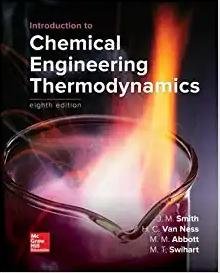Hydrogen gas can be produced by the reaction of steam with water gas, an equimolar mixture of
Question:
Hydrogen gas can be produced by the reaction of steam with “water gas,” an equimolar mixture of H2 and CO obtained by the reaction of steam with coal. A stream of “water gas” mixed with steam is passed over a catalyst to convert CO to CO2 by the reaction:
H2O(g) + CO(g) → H2(g) + CO2(g)
Subsequently, unreacted water is condensed and carbon dioxide is absorbed, leaving a product that is mostly hydrogen. The equilibrium conditions are 1 bar and 800 K.
(a) Is any advantage gained by carrying out the reaction at pressures above 1 bar?
(b) Would increasing the equilibrium temperature increase the conversion of CO?
(c) For the given equilibrium conditions, determine the molar ratio of steam to “water gas” (H2 + CO) required to produce a product gas containing only 2-mol-% CO after cooling to 20°C, where the unreacted H2O has been virtually all condensed.
(d) Is there any danger that solid carbon will form at the equilibrium conditions by the reaction
2CO(g) → CO2(g) + C(s)
Step by Step Answer:

Introduction To Chemical Engineering Thermodynamics
ISBN: 9781259696527
8th Edition
Authors: J.M. Smith, Hendrick Van Ness, Michael Abbott, Mark Swihart





